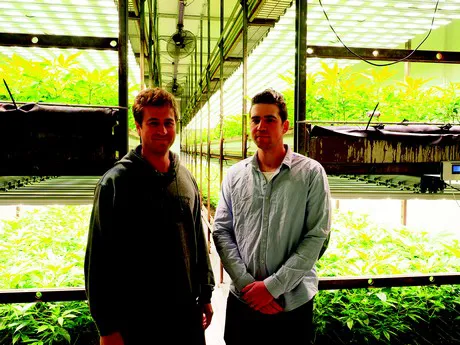In 2017 Swiss horticulture company Hempner International Ltd transitioned into cannabis crops. Today it’s one of the largest producers in the country, set on a rapid expansion. Daniel Zürcher, CEO at Hempner, shares the secret to success.
Before Hempner International transitioned into the cannabis industry, it was a regular agricultural company, cultivating different sorts of vegetables. Shrinking margins caused by competition from companies from Eastern Europe made Hempner reconsider its main focus and growth plans.
When cannabis became legalized in Switzerland in 2011 – for THC levels below 1% – it didn’t immediately create a lot of demand. In 2017, that changed. Daniel: “The sudden surge in interest in an industry that didn’t have a great deal of sales meant that the market was still relatively young and inexperienced. The result was that none of our traditional suppliers could effectively help out with pest control. They would point us in the direction of different chemical pesticides, but none of them proved to be adequate.”

“A professional gardening firm we were using, advised us to speak to Andermatt, distributor of Biobest Group. We had worked with them before, but over time we had lost contact. When we re-established our partnership, they immediately recommended Biobest beneficials for a biological pest control,” Daniel explains.
Through word-of-mouth advertising, Hempner started working with Andermatt and Biobest. Did they ever consider different products? “No,” Daniel says, “as we fully trust our partner’s expertise. When we first started working with Biobest products, we installed counter tests as well in different rooms. While the crops without their products ran into all sorts of problems, the crops that did receive the Biobest treatments bloomed without complications.”
While Switzerland is traditionally lenient considering regulations, Daniel insists that quality is never in short supply: “While pesticides aren’t wholly prohibited, few cannabis growers will use those, including Hempner. Delivering high quality products is our main focus, and biological pest control is the best way to achieve that. Moreover, to ensure quality we even developed our own LED lighting system, the ‘Hempner Skybar’.”
Since 2017 and the surge of cannabis’ popularity, many growers have disappeared nonetheless. “But those that continue have considerably upped the standards and became more professional,” Daniel assures. “Trustworthy partnerships are key in that regard: we have monthly meetings with Andermatt who are helping us to finetune our processes and we recently had a seminar with Biobest. They came in, did some research and gave us some tips on how to improve even further. We’re always willing to learn and improve, and extra pairs of eyes can only help.”
Although biological pest control isn’t mandatory (in Switzerland), Daniel Zürcher is convinced that it is necessary to deliver qualitative products. Preventive measures are a key element in successful crops, but when problems suddenly arise, scalability is an important factor as well. Daniel concludes: “Biobest and Andermatt have proven to be trustworthy, considerate partners who have been instrumental in our growth project.”
For more information: 
BioBest
Ilse Velden 18
2260 Westerlo - Belgium
T +32 14 25 79 80
F +32 14 25 79 82
biobestgroup.com
